What we learned from Nicola Sturgeon's memoir
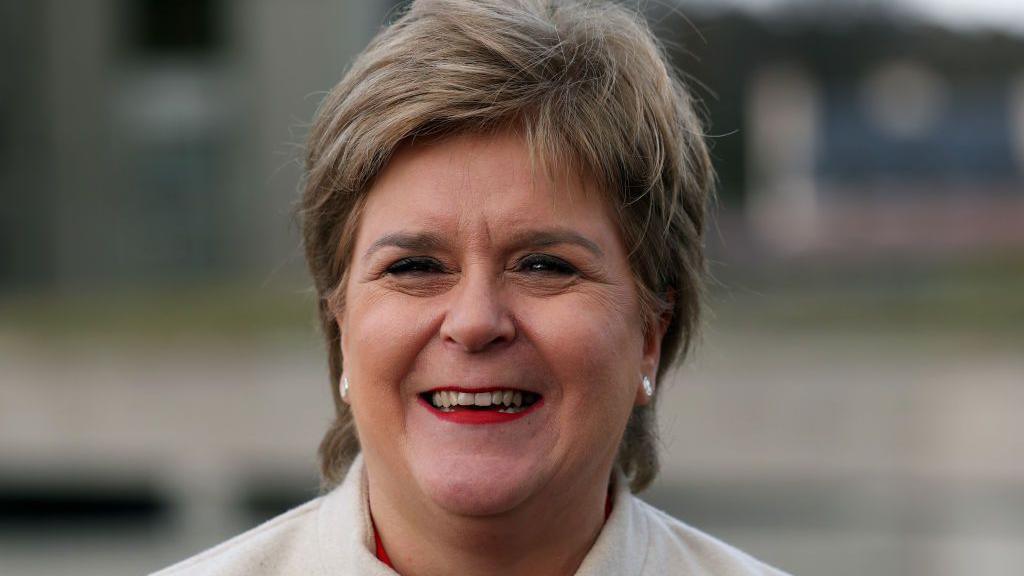
- Published
Nicola Sturgeon's memoir Frankly is now on sale, slightly earlier than expected after newspaper serialisations and interviews teased some tantalising extracts.
True to its title, the book has Scotland's former first minister writing candidly about the highs and lows of her time in office including challenges she says had a serious impact on her mental health.
So with the full text now available, what are the key things we have learned?
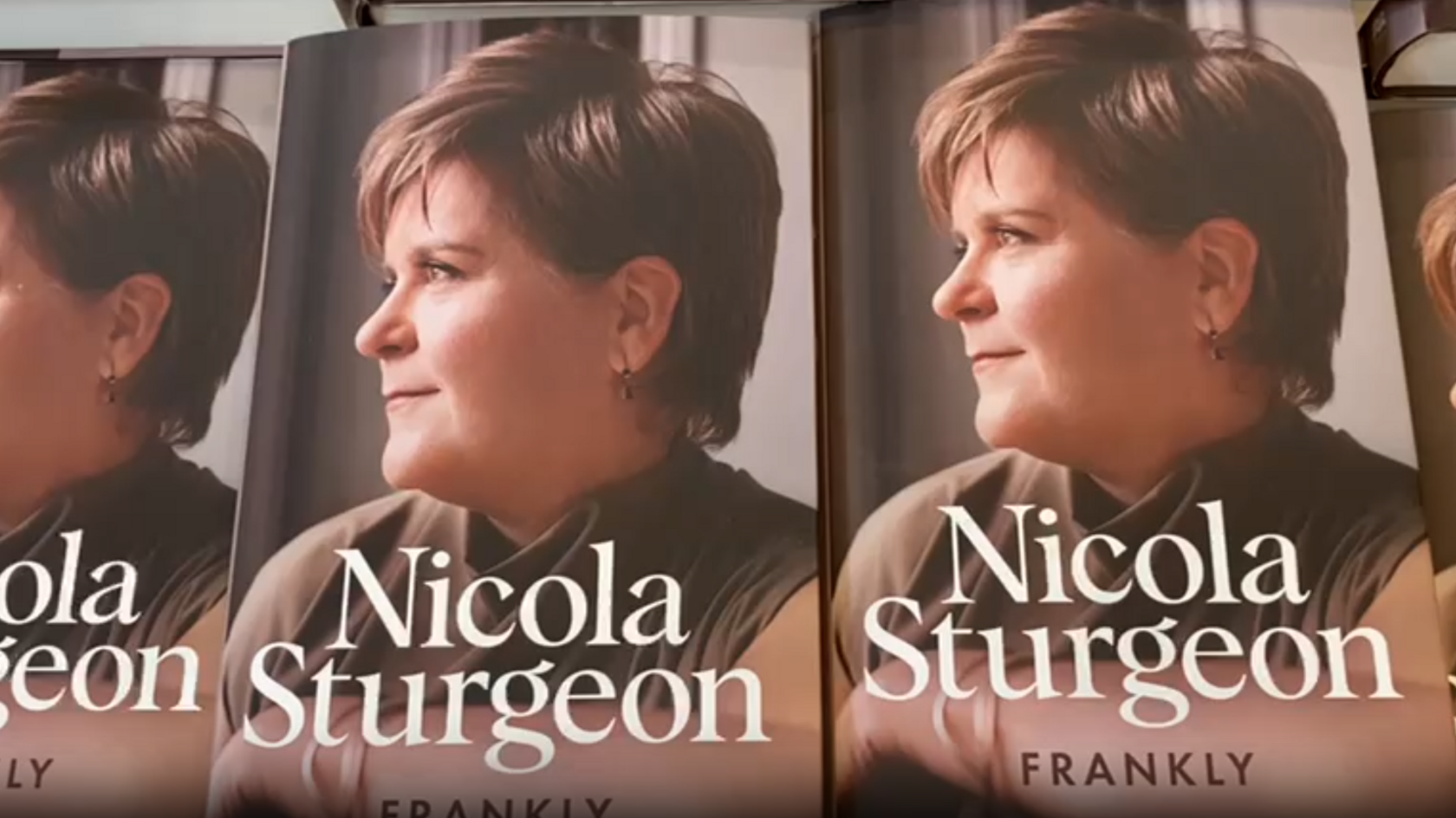
Nicola Sturgeon's book Frankly went on sale earlier than expected
Transgender controversy
After more than eight years in power, and eight election victories, Sturgeon saw her final months in office marred by rows about trans issues.
It was, she writes in her memoir, a time of "rancour and division".
Sturgeon now admits to having regrets about the process of trying to legislate to make it easier to legally change gender, saying she has asked herself whether she should have "hit the pause button" to try to reach consensus.
"With hindsight, I wish I had," she writes, although she continues to argue in favour of the general principle of gender self-identification.
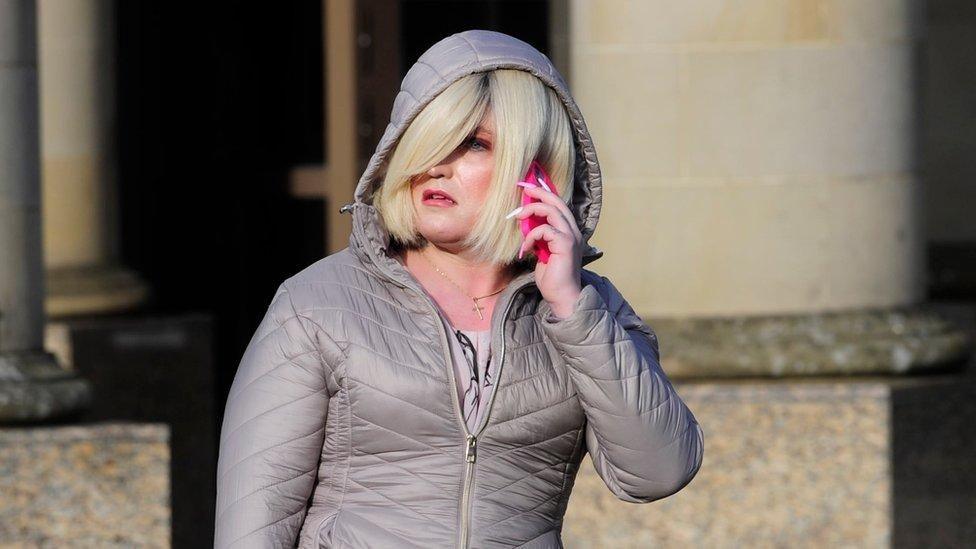
Isla Bryson was jailed in 2023 after being convicted of rape
Sturgeon also addresses the case of double rapist Adam Graham, who was initially sent to a female prison after self-identifying as a woman called Isla Bryson.
It was, writes Sturgeon, a development "that gave a human face to fears that until then had been abstract for most people".
As first minister she sometimes struggled to articulate her position on the case and to decide which, if any, pronoun to use to describe Bryson.
"When confronted with the question 'Is Isla Bryson a woman?' I was like a rabbit caught in the headlights," she writes.
"Because I failed to answer 'yes', plain and simple... I seemed weak and evasive. Worst of all, I sounded like I didn't have the courage to stand behind the logical conclusion of the self-identification system we had just legislated for.
"In football parlance, I lost the dressing room."
Speaking to ITV News on Monday, Sturgeon said she now believed a rapist "probably forfeits the right" to identify as a woman.
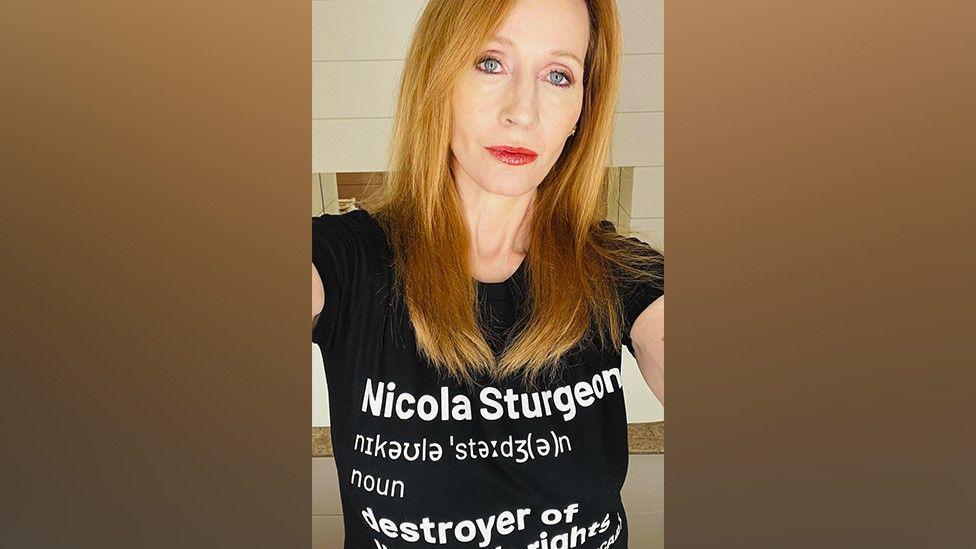
JK Rowling posted a selfie of herself wearing a T-shirt describing Sturgeon as a "destroyer of women's rights"
The former first minister also criticises her highest-profile opponent on the gender issue, Harry Potter author JK Rowling, for posting a selfie in a T-shirt bearing the slogan "Nicola Sturgeon, destroyer of women's rights".
"It resulted in more abuse, of a much more vile nature, than I had ever encountered before. It made me feel less safe and more at risk of possible physical harm," she writes.
Sturgeon adds that "it was deeply ironic that those who subjected me to this level of hatred and misogynistic abuse often claimed to be doing so in the interests of women's safety".
She told BBC Newscast that the difference in "vitriol" she received before and after JK Rowling's post "was quite stark" although she stressed she did not believe she should have been immune to criticism.
Asked specifically for a response to the Newscast interview, the author's spokesperson said "JK Rowling won't be commenting".
Rowling has, however, posted on X, external that she is planning to review the memoir, and may auction an annotated copy - which features some strong language - to raise funds for a women's charity.
Her relationship with Alex Salmond
Sturgeon's mentor and predecessor as first minster, Alex Salmond, is mentioned dozens of times in the book, often in unflattering terms which reflect their estrangement after he was accused of sexual offences.
Salmond won a judicial review of the Scottish government's handling of complaints against him and in 2020 was cleared of all 13 charges but his reputation was sullied by revelations in court about inappropriate behaviour with female staff.
Sturgeon lambasts Salmond's claim that he was the victim of a conspiracy, saying there was no obvious motive for women to have concocted false allegations which would then have required "criminal collusion" with politicians, civil servants, police and prosecutors.
"He impugned the integrity of the institutions at the heart of Scottish democracy," she writes, adding: "He was prepared to traumatise, time and again, the women at the centre of it all." The claims have been angrily rejected by Salmond's allies.
The former SNP leader died of a heart attack in North Macedonia last year, aged 69.
The independence referendum
Nicola Sturgeon recalls a "totally uncharacteristic sense of optimism" as Scotland prepared to vote on whether to become an independent nation on 18 September 2014.
It was arguably the defining event of her professional life and, in her view, a chance to "create a brighter future for generations to come".
The campaign was tough, she says, partly because of what she calls unbalanced coverage by the British media including the BBC and partly because Salmond left her to do much of the heavy lifting.
"It felt like we were trying to push a boulder up hill," she writes.
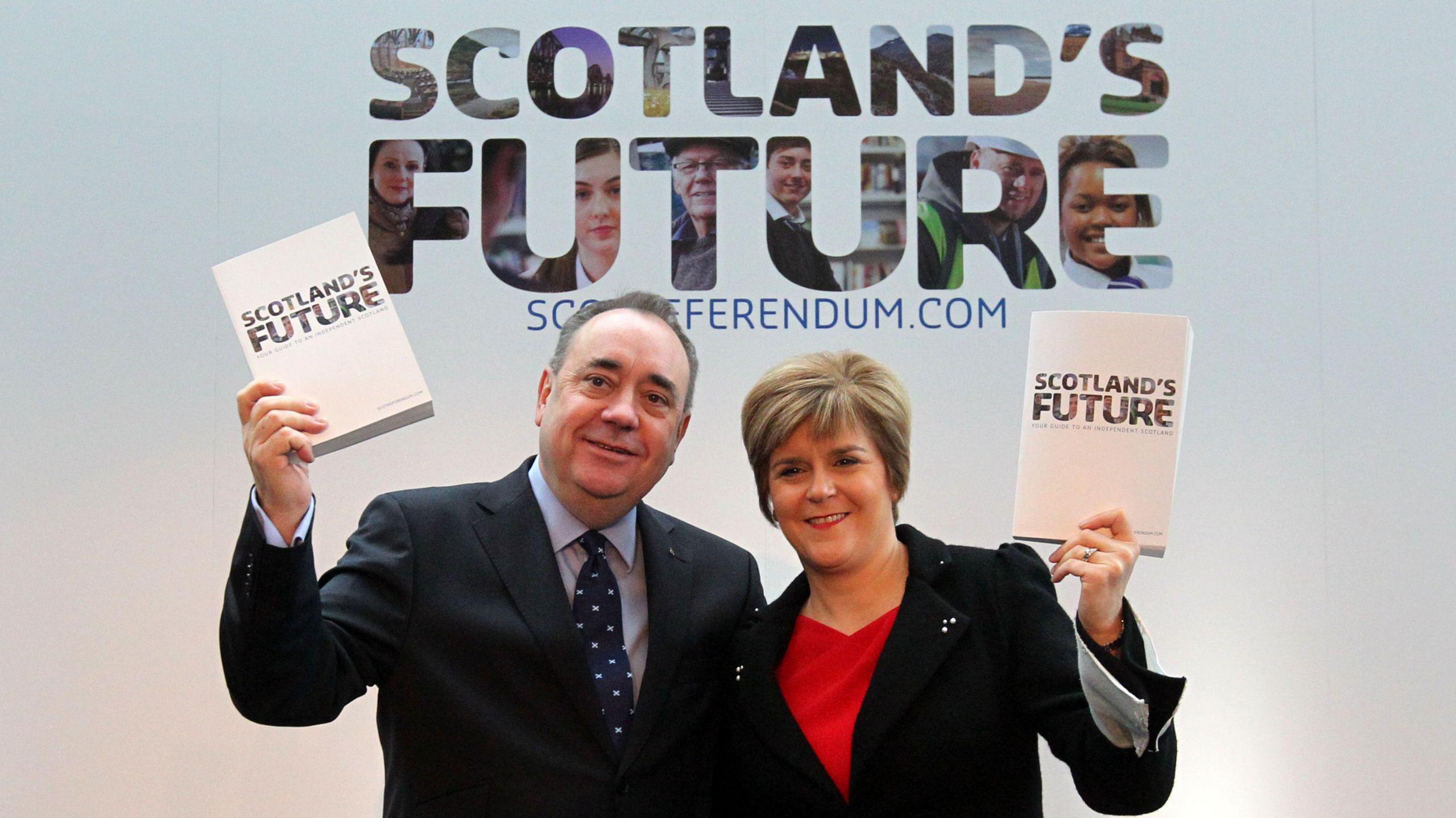
Sturgeon claims Alex Salmond showed little interest in the "detail" of the independence white paper
A key period in the lead-up to the poll was her preparation, as deputy first minister, of a white paper setting out the case for independence.
At one point, she says, the magnitude of the task left her in "utter despair" and "overcome by a feeling of sheer impossibility".
"I ended up on the floor of my home office, crying and struggling to breathe. It was definitely some kind of panic attack," she writes.
Sturgeon says Salmond "showed little interest in the detail" of the document and she was "incandescent" when he flew to China shortly before publication without having read it.
"He promised he would read it on the plane. I knew his good intention would not survive contact with the first glass of in-flight champagne," she writes.
Operation Branchform
Sturgeon describes her "utter disbelief" and despair when police raided her home in Glasgow and arrested her husband, Peter Murrell, on 5 April 2023.
"With police tents all around it, it looked more like a murder scene than the place of safety it had always been for me. I was devastated, mortified, confused and terrified."
In the weeks that followed she says she felt like she "had fallen into the plot of a dystopian novel".
Sturgeon calls her own arrest two months later as part of the inquiry into SNP finances known as Operation Branchform "the worst day" of her life.
She was exonerated. Murrell, the former SNP chief executive, has been charged with embezzlement.
The couple announced they were separating earlier this year.
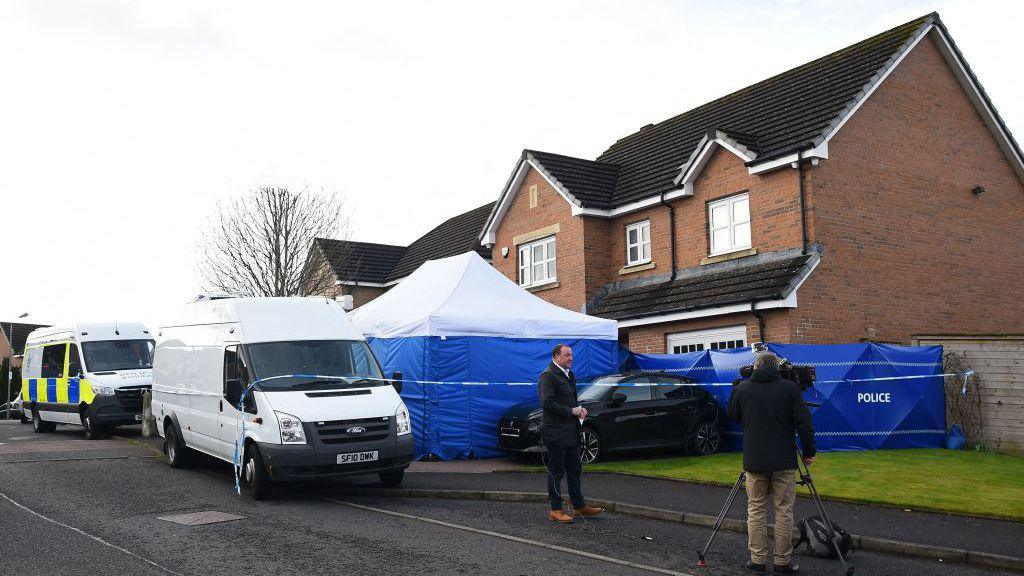
Sturgeon described her house as looking like a murder scene
Leading Scotland during the pandemic
For Sturgeon, the coronavirus pandemic which struck the world five years ago still provokes "a torrent of emotion".
Leading Scotland through Covid was "almost indescribably" hard and "took a heavy toll, physically and mentally", writes the former first minister.
She says she will be haunted forever by the thought that going into lockdown earlier could have saved more lives and, in January 2024, after she wept while giving evidence to the UK Covid inquiry, she "came perilously close to a breakdown".
"For the first time in my life, I sought professional help. It took several counselling sessions before I was able to pull myself back from the brink," she writes.
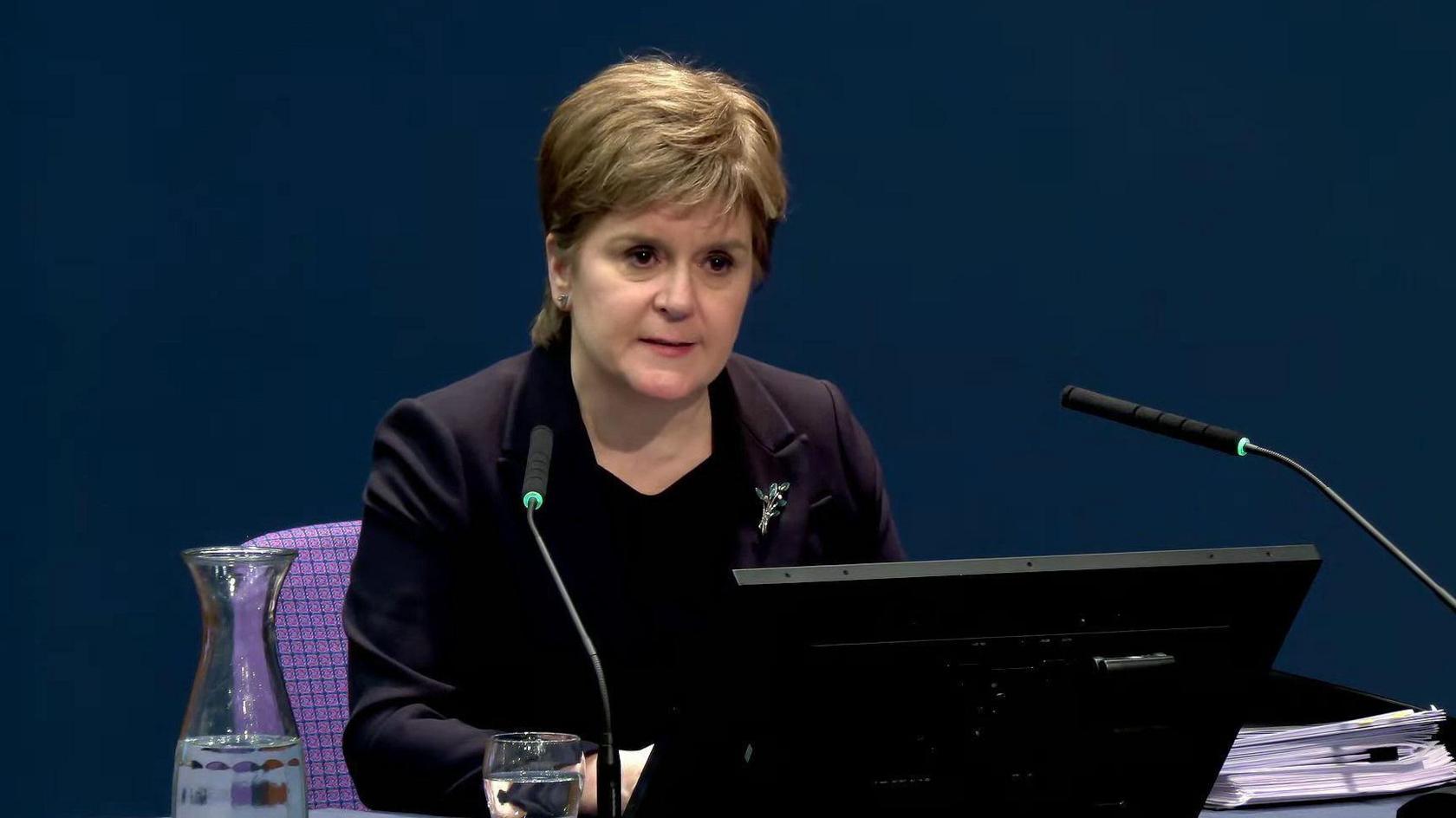
Nicola Sturgeon appeared visibly upset when giving evidence to the Covid Inquiry
Misogyny and sexism
Scathing comments about the inappropriate behaviour of men are scattered throughout the book.
"Like all women, since the dawn of time, I have faced misogyny and sexism so endemic that I didn't always recognize it as such," Sturgeon writes on the very first page.
One grim story, from the first term of the Scottish Parliament which ran from 1999 to 2003, stands out.
Sturgeon says a male MSP from a rival party taunted her with the nickname "gnasher" as he spread a false rumour that she had injured a boyfriend during oral sex.
"On the day I found out about the story, I cried in one of the toilets in the Parliament office complex," she writes.
She said it was only years later, after #MeToo, that she realised this had been "bullying of an overtly sexual nature, designed to humiliate and intimidate, to cut a young woman down to size and put her in her place".
Her personal life
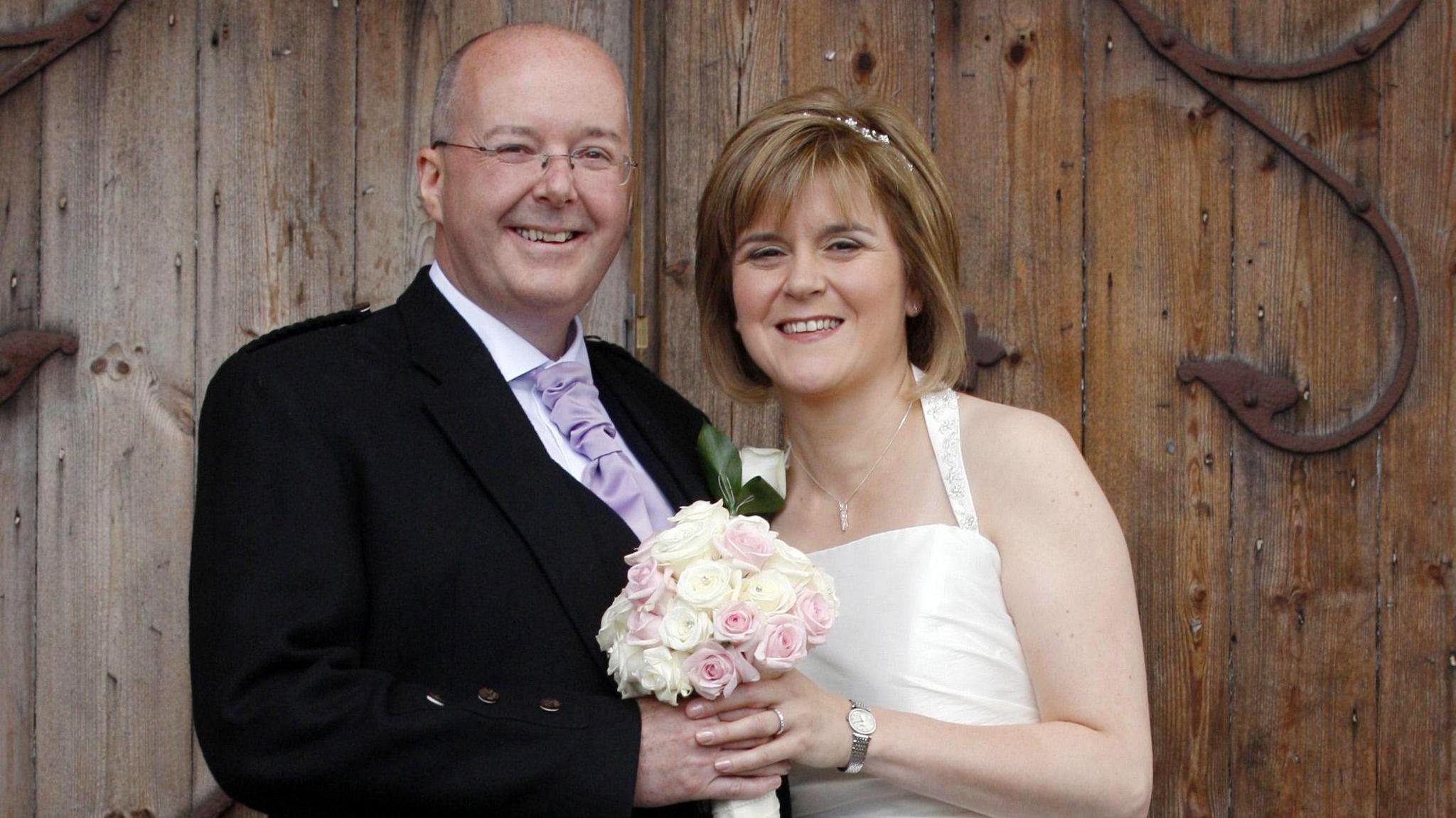
Parts of the memoir are deeply personal.
Nicola Sturgeon says she may have appeared to be a confident and combative leader but underneath she is a "painfully shy" introvert who has "always struggled to believe in herself".
She writes in detail about the "excruciating pain" and heartbreak of suffering a miscarriage after becoming pregnant at the age of 40.
"Later, what I would feel most guilty about were the days I had wished I wasn't pregnant," she says.
Sturgeon touches on the end of her marriage, saying "I love him" but the strain of the past couple of years was "impossible to bear".
She also writes about her experience of the menopause, explaining that "one of my deepest anxieties was that I would suddenly forget my words midway through an answer" at First Minister's Question Time.
"My heart would race whenever I was on my feet in the Chamber which was debilitating and stressful," she says.
And she addresses "wild stories" about her having a torrid lesbian affair with a French diplomat by saying the rumours were rooted in homophobia.
"The nature of the insult was water off a duck's back," she writes.
"Long-term relationships with men have accounted for more than thirty years of my life, but I have never considered sexuality, my own included, to be binary. Moreover, sexual relationships should be private matters."
What the future holds
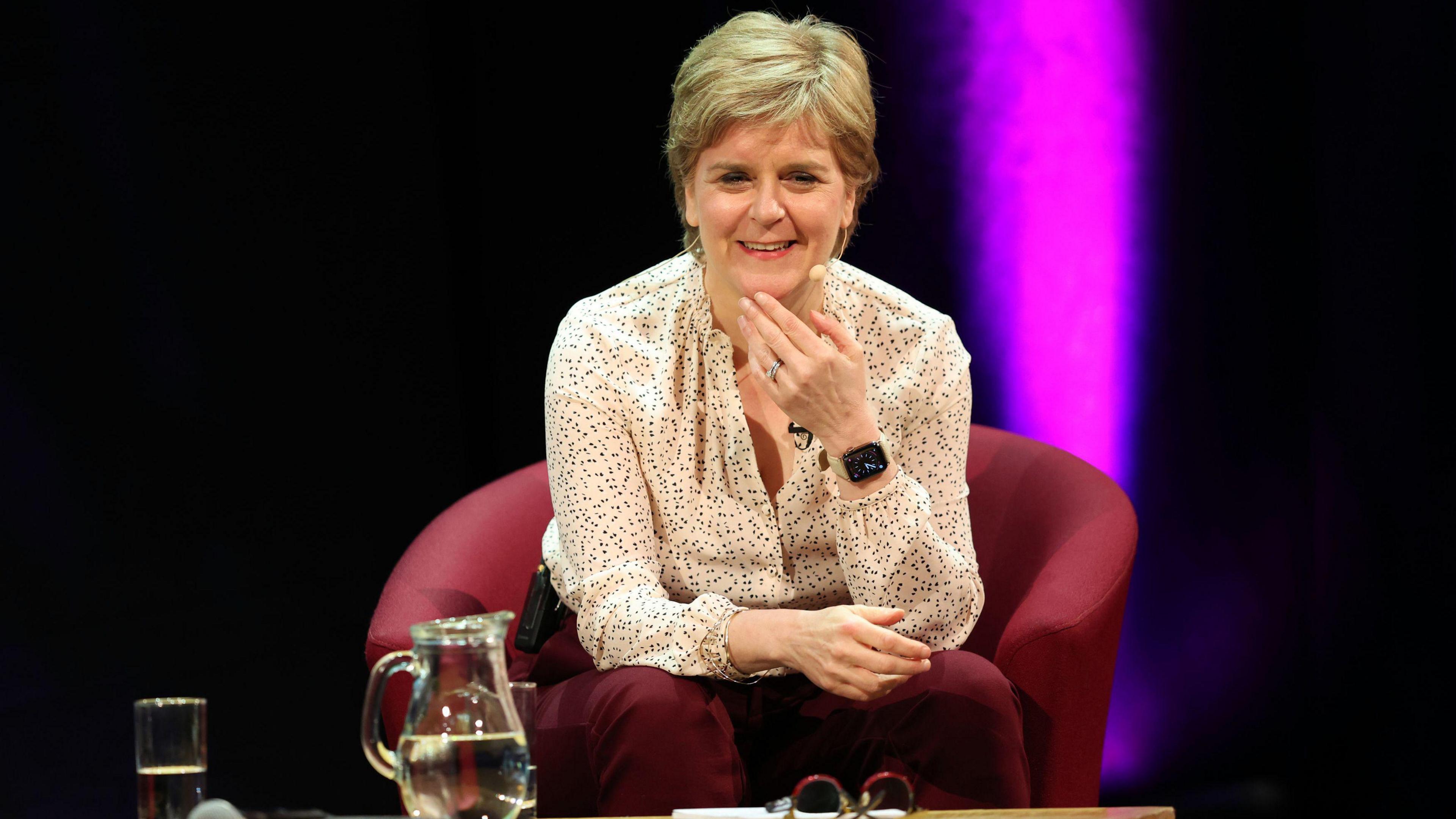
Sturgeon loves books and has often appeared at literary events such as Aye Write in Glasgow
Nicola Sturgeon has a few regrets.
These include pushing hard for a second independence referendum immediately after the UK voted - against Scotland's wishes - to leave the EU, and branding the 2024 general election as a "de facto referendum" on independence.
But now, she says, she is "excited about the next phase" of her life which she jokingly refers to as her "delayed adolescence".
"I might live outside of Scotland for a period," Sturgeon writes.
"Suffocating is maybe putting it too strongly, but I feel sometimes I can't breathe freely in Scotland," she told the BBC's Newscast podcast.
"This may shock many people to hear," she continues, "but I love London."
She is also considering writing a novel.
Nicola Sturgeon concludes her memoir by saying she believes Scotland will be independent within 20 years, insisting she will never stop fighting for that outcome and adding: "That, after all, is what my life has been about."

Sign up for our Politics Essential newsletter to keep up with the inner workings of Westminster and beyond.